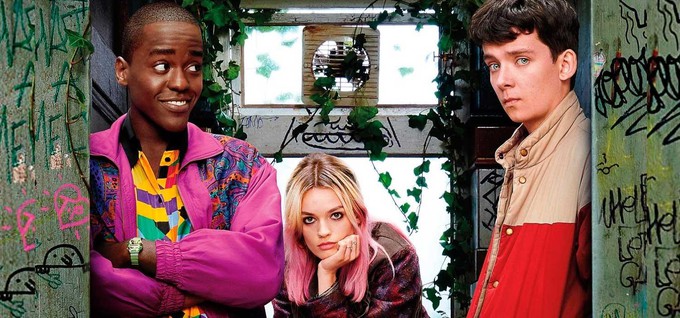
After watching the trailer for SEX EDUCATION, it was difficult not to peg it as an updated take on quirky teen character studies as The Art of Getting By (2011) or, more appropriately yet, Charlie Bartlett (2007). With its high concept set up introducing us to Gillian Anderson and Asa Butterfield as Jean and Otis Milburn respectively, a professional sex therapist and her introverted son. For whom his mother’s work- and refreshingly frank sex life- proves to be not only unsolicited homeschooling but, actually, an unexpected way to make money by becoming the self-appointed sex advisor in his high school.
Somewhat disappointingly, the show from very promising first-time creator/showrunner Laurie Nunn sticks way closer to ensemble teen dramas such as The O.C. or Dawson’s Creek (with lots more nudity, for sure); setting initial expectations aside and taking it as such, the series more than sticks the landing after a particularly rough start.
The first two episodes promised a genuinely awful run, though. Anchored by a spirited central performance from Asa Butterfield, who is entirely left behind his tween days to embrace his adolescence/incipient manhood period (he is 22, in any case). He looks very much like younger versions of Elijah Wood, David Faustino and, well, himself. The beginning is nothing but a profoundly trite amalgam of the most tired and tiresome high school comedy cliches. That comes not so much from the characters themselves (stereotypical enough, granted, but winningly portrayed by every single cast member) as from writing and directing that blindly rely on the very worst tropes of the subgenre. Mom is nosy and looks around his bedroom; best friend is black and flamboyantly gay; the bad girl is terrible because of her nose piercing, dyed hair and punk stylings; the headmaster’s son is the resident bully; the popular girls are mean. Worse yet was the stale humor, desperately aiming for an artificially American feel that felt as annoying as limp (it is a British show, shot mostly in Wales).
Then the show shifts gears abruptly and delivers the highest point of the season. Maeve (Emma Mackey, achieving sincere humanity from a character written as, mostly, one-note), the trailer park punk girl who comes up with the idea to monetize Otis’ very specific knowledge, chooses to have an abortion and, in lieu of better options, is forced to ask him to go pick her up at the clinic. This episode is a gem, in turns heartbreaking, touching and witty. Also, it embraces for the first time its own idiosyncratic approach and, shockingly, manages to extract honest laughter from the otherwise outright depressing plot. From this point on goodwill has been earned and we are more than willing to fully empathize with these characters, hang out with them and see what comes up next.

The swift season chronicles, in a mere eight episodes, how therapy sessions become a success allowing Otis to gain some heretofore unknown self-confidence (and cash) and how they bring him and Maeve closer while, simultaneously, alienating best friend Eric (Ncuti Gatwa). At the same time, we come to understand how Jean’s addiction to one-night stands is merely a self-defense mechanism to avoid anything akin to her disastrous marriage to Otis’ father from ever occurring again.
But the peripheral supporting characters eventually and deservedly crawl their way into the spotlight, as well. Adam, an unrepentant homophobic underachiever, clings onto the very edge of the precipice. One step away from being sent to a military academy by his strictly demanding father, the school’s principal and a bully himself. It is a testament to Connor Swindell’s creation that we actually care about and root for such an almost entirely despicable human being; his ultimately predictable fate does nothing to detract from a fascinating arc. Likewise, first-time actress Aimee Lou Wood imbues her namesake character, hardly anything more than a sexpot bimbo on the page, with a discordant naïveté- sometimes alluring, often extremely exasperating- that makes her surprisingly real.
Along the way, we are treated to some deliciously satisfying stories, at once funny and compellingly touching like a teasing apparition across all cell phones on the campus of an incredibly intimate selfie (not the most conventionally flattering capture of female genitalia). That turns Maeve and Otis into amateur sleuths and, in the process, brings to the fore the rapidly eroding relationship between him and Eric and a genuinely devastating breaking point for the latter. Or how Jean, played with Anderson’s expected flair for academic detachment, starts feeling extremely attracted to Swedish handyman Jakob (Mikael Persbrandt) in spite of all the warning cries of her snobbish reticence.
All of this wrapped, very much as in The Chilling Adventures of Sabrina, in a decidedly anachronistic package that mixes production and costume design deeply rooted in late 70s- early 80s aesthetic and an eclectic soundtrack that throws together everything from a heavy dose of Ezra Furman to Bikini Kill, INXS and A Flock of Seagulls just to give you an idea. The resulting concoction is amiably playful and blends flawlessly with the rest of Nunn’s approach to the subject matter.
Storylines come and go, fleshing out motivations and showing us both these people’s advances and setbacks, but what really keeps this entire endeavor triumphantly afloat is the humanity on display and the empathy it awakens. SEX EDUCATION is not really about the sex, initial pitch notwithstanding, and although there is nudity galore and an abundance of thoroughly frank depictions of the act (heterosexual and homosexual alike) its focus is never exploitation, its intent never to titillate. This is a show about people, and it is as contrary to dehumanizing as it is possible to be.
It would be remiss of me not to single out the astonishing performance from Ncuti Gatwa who is given, at first sight, nothing more than the thankless role of gay sidekick. The writers’ insistence on carefully examining his life, both in school and at home, goes a long way to ensure it actually becomes a three-dimensional kid. Certainly, but it is Gatwa’s fearless plunge into completely becoming Eric that doesn´t even allow you to remember previous, now cringe-worthy renditions of similar characters like, say, Meshach Taylor’s Hollywood in the Mannequin movies. His Eric can´t become any more genuine, and this feat becomes even more significant since, out of the whole cast, he is the one required to explore most of his character. We follow him as he stumbles from effervescent exuberance to cynical bitterness, to impotent rage, to unbelieving hopefulness without the slightest hitch to denote hyperbolic histrionics- a joy to behold. He deserves the brightest of futures.
And SEX EDUCATION more than deserves to be given its own shot, as well.
Eloy Ricardo Balderas Salazar
